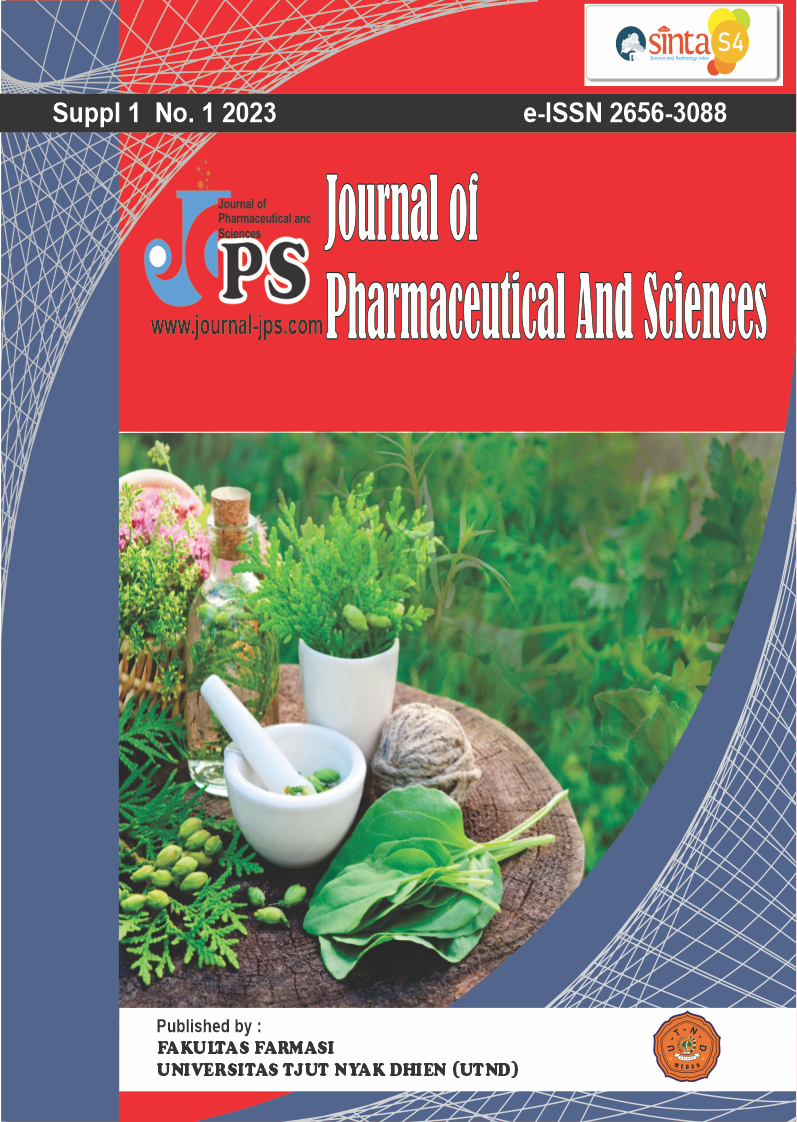Toxicity test of red palm (Cyrtostachys renda Blume.) using the brine shrimp lethality test (BSLT) method
Main Article Content
Page: 407-413
Abstract
The red palm plant (Cyrtostachys renda) is a species of the Areca genus that grows widely in Jambi Province, making it an affordable plant to research for its medicinal properties. The Brine Shrimp Lethality Test (BSLT) is a toxicity test to screen for anticancer bioactive substances, with the test subject being Artemia salina Leach larvae, which are highly sensitive when exposed to toxic substances. The fruit and roots of C. renda were extracted using the maceration method by using a methanol solvent and partitioning using n-hexane, dichloromethane, ethyl acetate, and water. Based on the extract toxicity evaluation results, all extracts were toxic. Meanwhile, C.renda root dichloromethane extract had the highest toxic properties, with an LC50 value of 43.42 ± 0.659 ppm. However, the positive control's toxicity, potassium dichromate, was more toxic, with an LC50 value of 29.93 ± 0.668 ppm. The dichloromethane extract of C. renda roots can potentially be a poisonous agent. Further toxicity tests on cancer cells need to be carried out to be developed as an anticancer agent.
Downloads
Article Details

This work is licensed under a Creative Commons Attribution-NonCommercial-ShareAlike 4.0 International License.
References
Ahmed, N., Kumar S, V., Alphonso, J., Chandrasekar, S., & Boopathy, U. (2022). Phytochemical Screening, Antioxidant Potential, Isolation, And Characterization Of Bioactive Compound From Enhalus acoroides. Journal of Pharmaceutical Negative Results, 13, 4118–4131. https://doi.org/10.47750/PNR.2022.13.S09.511
Muthmainnah B. (2019). Skrining Fitokimia Senyawa Metabolit Sekunder dari Ekstrak Etanol Buah Delima (Punica granatum L.) dengan Metode Uji Warna. Media Farmasi, 13(2), 36–41. https://doi.org/10.32382/MF.V13I2.880
Cancer Indonesia 2020 country profile. (2020). https://www.who.int/publications/m/item/cancer-idn-2020
Anonim. (2017). Farmakope Herbal Indonesia Edisi II. Direktorat Jenderal Kefarmasian dan Alat Kesehatan. https://farmalkes.kemkes.go.id/unduh/farmakope-herbal-indonesia-edisi-ii-tahun-2017/
Libralato, G., Prato, E., Migliore, L., Cicero, A. M., & Manfra, L. (2016). A review of toxicity testing protocols and endpoints with Artemia spp. Ecological Indicators, 69, 35–49. https://doi.org/10.1016/J.ECOLIND.2016.04.017
Martinus, B. (2020). Pengaruh Pemberian Salep Ekstrak Etanol Daun Piladang (Solenostemonscutellarioides(L). Codd) selama 15 Hari Secara Topikal Terhadap Aktivitas Penyembuhan Luka Eksisi pada Tikus Putih Jantan. SCIENTIA Jurnal Farmasi Dan Kesehatan, 9(2), 192. https://doi.org/10.36434/SCIENTIA.V9I2.314
Harborne, J. (1987). Metode Fitokimia: Penuntun Cara Modern Menganalisis Tumbuhan. Penerbit ITB. https://lib.ui.ac.id/detail?id=20284797&lokasi=lokal
Muharrami, L. K., Munawaroh, F., Ersam, T., & Santoso, M. (2020). Phytochemical Screening of Ethanolic Extract: a Preliminary Test on Five Medicinal Plants on Bangkalan. Jurnal Pena Sains, 7(2), 96–102. https://doi.org/10.21107/JPS.V7I2.8722
Mutiah, R., Listyana, A., Suryadinata, A., Biologi Farmasi, D., Farmasi Fakultas Kedokteran dan Ilmu Kesehatan Universitas Islam Negeri Maulana Malik Ibrahim Malang, J., Studi Pendidikan Dokter Fakultas Kedokteran dan Ilmu Kesehatan Universitas Islam Negeri Maulana Malik Ibrahim Malang ABSTRAK, P., & Mutiah, R. (2017). Anticancer Activity of Combination of Benalu Belimbing (Macrosolen cochinensis) Extract and Sabrang Onion (Eleutherine palmifolia (L) Merr) on Cervical Cancer Hela Cell Line. Majalah Obat Tradisional, 22(3), 146–152. https://doi.org/10.22146/MOT.22009
Neves, R. A. F., Fernandes, T., Dos Santos, L. N., & Nascimento, S. M. (2017). Toxicity of benthic dinoflagellates on grazing, behavior, and survival of the brine shrimp Artemia salina. PLoS ONE, 12(4). https://doi.org/10.1371/JOURNAL.PONE.0175168
Ntungwe N, E., Domínguez-Martín, E. M., Roberto, A., Tavares, J., Isca, V. M. S., Pereira, P., Cebola, M.-J., & Rijo, P. (2020). Artemia species: An Important Tool to Screen General Toxicity Samples. Current Pharmaceutical Design, 26(24), 2892–2908. https://doi.org/10.2174/1381612826666200406083035
Sarah, Q. S., Anny, F. C., & Misbahuddin, M. (2017). Brine shrimp lethality assay. Bangladesh Journal of Pharmacology, 12(2), 186–189. https://doi.org/10.3329/BJP.V12I2.32796
Silalahi, M., Supriatna, J., Walujo, E. B., & Nisyawati. (2015). Local Knowledge of Medicinal Plants in Sub-Ethnic Batak Simalungun of North Sumatra, Indonesia. Biodiversitas Journal of Biological Diversity, 16(1), 44–54. https://doi.org/10.13057/BIODIV/D160106
Yanti, S., & Vera, Y. (2019). Skrining Fitokimia Ekstrak Daun Belimbing Wuluh (Averrhoa Bilimbi ). Jurnal Kesehatan Ilmiah Indonesia, 4(1), 41–46. https://jurnal.unar.ac.id/index.php/health/article/view/177
Supriningrum, R., Fatimah, N., Yenni, D., Purwanti, E., Farmasi, P. D.-3, Tinggi, S., & Samarinda, I. K. (2019). Karakterisasi Spesifik dan Non Spesifik Ekstrak Etanol Daun Putat (Planchonia valida). AL ULUM: JURNAL SAINS DAN TEKNOLOGI, 5(1), 6–12. https://doi.org/10.31602/AJST.V5I1.2468
Syahadat, A., Siregar, N., Studi, P., Program, F., Fakultas, S., Universitas, K., Royhan, A., & Kotapadangsidimpuan, D. (2020). Skrining Fitokimia Daun Katuk ( Sauropus androgynus ) sebagai Pelancar ASI. Jurnal Kesehatan Ilmiah Indonesia / Indonesian Health Scientific Journal, 5(1), 85–89. https://doi.org/10.51933/HEALTH.V5I1.246
Zulia, G., Sri, R. &, Fitrianingsih, P., & Lestari, F. (2021). Studi Literatur Aktivitas Sitotoksik Ekstrak Rimpang Genus Curcuma dengan Metode Brine Shrimp Lethality Test (BSLT). Prosiding Farmasi, 0(0), 468–474. https://doi.org/10.29313/.V0I0.29557





